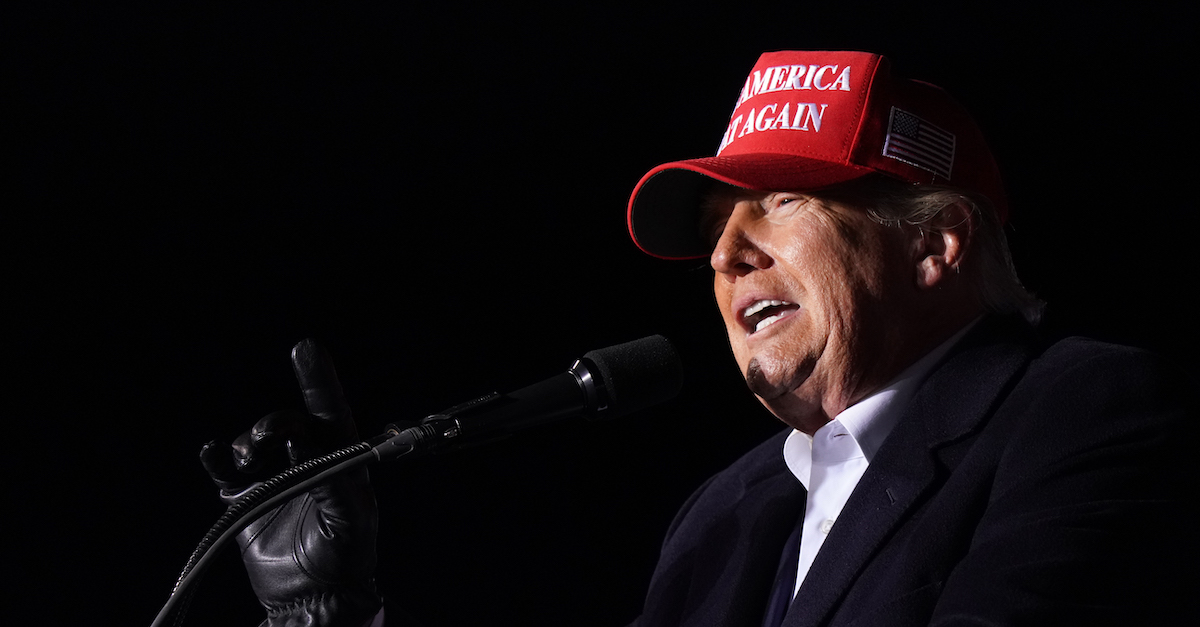
Former US President Donald Trump speaks to the crowd during a rally at the Florence Regional Airport on March 12, 2022 in Florence, South Carolina.
Former President Donald Trump failed to shake off a contempt order fining him $10,000 per day for flouting New York Attorney General Letitia James’s (D) subpoena. The Manhattan judge presiding over the case found Trump’s affirmation of compliance “insufficient.”
“This Court finds that Mr. Trump has not yet purged his contempt,” Manhattan Supreme Court Justice Arthur Engoron wrote in a two-page order on Friday. “The affirmations submitted by counsel for Mr. Trump are insufficient in that they fail to specify who searched for each respective request, at what time, where, and using what search protocols; it is not sufficient simply to attach a list of people who participated in the searches. Moreover, the affirmations submitted by counsel also fail to affirm that the subject electronic devices were imaged and searched and with what search terms.”
On Monday, Engoron initially issued his contempt order following oral arguments inside a courtroom in lower Manhattan, finding his defense team’s “boilerplate” objections to James’s subpoenas flouted his prior order to produce documents. He pronounced his ruling with the banging of a gavel and addressed the former president—who was not present in the courtroom on that day earlier this week—with a flourish: “Mr. Trump, I know you take your business seriously, and I take mine seriously.”
James has been investigating whether the Trump Organization and the former president himself inappropriately inflated or deflated his assets in order to obtain tax benefits. For example, she says, her investigation has uncovered that Trump inflated the size of his Trump Tower triplex by three times its actual size for tax purposes.
The probe remains ongoing, and James’s assistant Kevin Wallace recently told the judge that getting information from Trump’s defense team is like “pulling teeth.”
Trump’s lawyer Alina Habba claimed that they have complied with the investigation—and insisted that there is no more to disclose. The former president does not communicate by text or email, and so there is no more information left to disclose, she says.
“Today’s events have made it overwhelmingly clear that this case no longer has anything to do with the proper application of legal principles governing discovery disclosure,” Habba told Law&Crime in an email. “The Court completely disregarded the detailed affidavits that demonstrate the meticulous efforts undertaken to effectuate this search. This Court has improperly held my client in contempt for a violation that he did not commit solely because the OAG declared it ‘insufficient’ without any basis. The tactics employed by this Court, including the dramatic pounding of the gavel, the statements directed to our client from the bench, and direct comments to the press have reduced this hearing to the likes of a public spectacle. We will zealously prosecute our appeal of the Court’s improper application of both law and fact.”
Since the judge issued his written order on Tuesday, the $10,000 per day penalty has been lapsing, and Trump tried to cure it on Wednesday by submitting two affirmations: one by the former president and another by his lawyer.
On Friday, the attorney general’s office was not satisfied and opposed lifting the contempt order. Judge Engoron held a virtual hearing on the matter earlier today and reached the same conclusion, formalizing his findings in a written ruling.
“Furthermore, Mr. Trump’s personal affidavit is completely devoid of any useful detail,” Engoron wrote. “Notably, it fails to state where he kept his files, how his files were stored in the regular course of business, who had access to such files, what if any, the retention policy was for such files, and, importantly, where he believes such files are currently located. It similarly fails to state if he turned over his personal electronic devices for imaging and searching.”
Engoron ordered the submission of a so-called “Jackson affidavit,” swearing to those details. The precedent for such an order comes from a case captioned Jackson v City of New York, an 1992 state appellate ruling mandating such a detailed affidavit.
His written opinion followed a virtual conference earlier on Friday.
Update—April 29 at 7:14 p.m. Eastern Time: This story has been updated to include comment by Trump’s attorney Alina Habba.
Read the ruling, below:
(Photo by Sean Rayford/Getty Images)